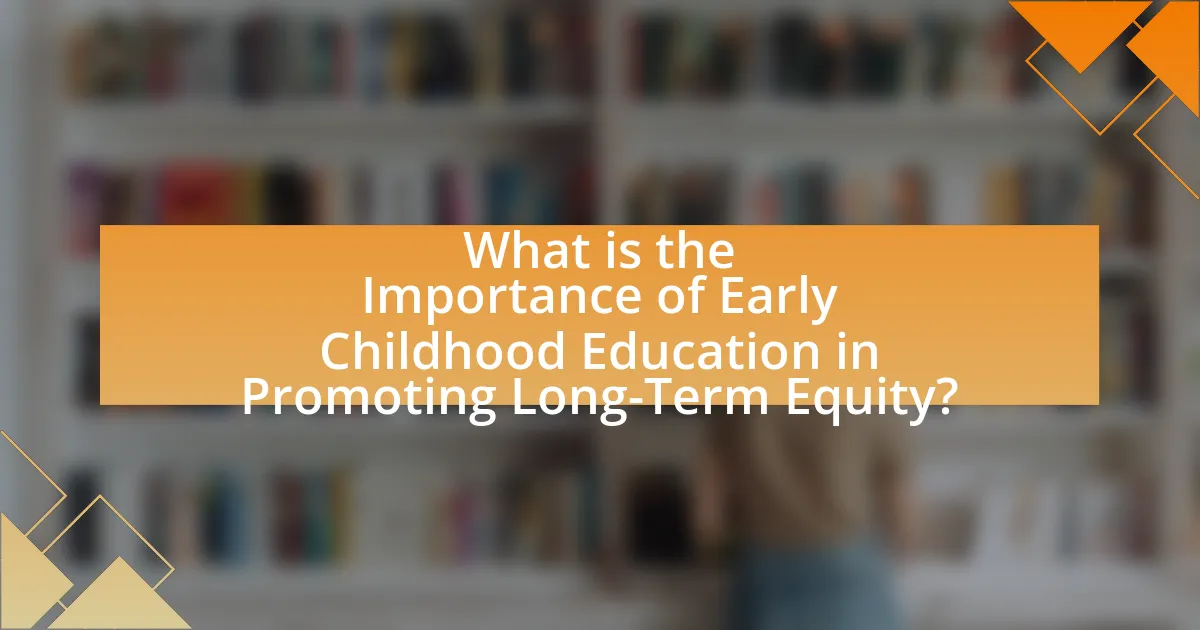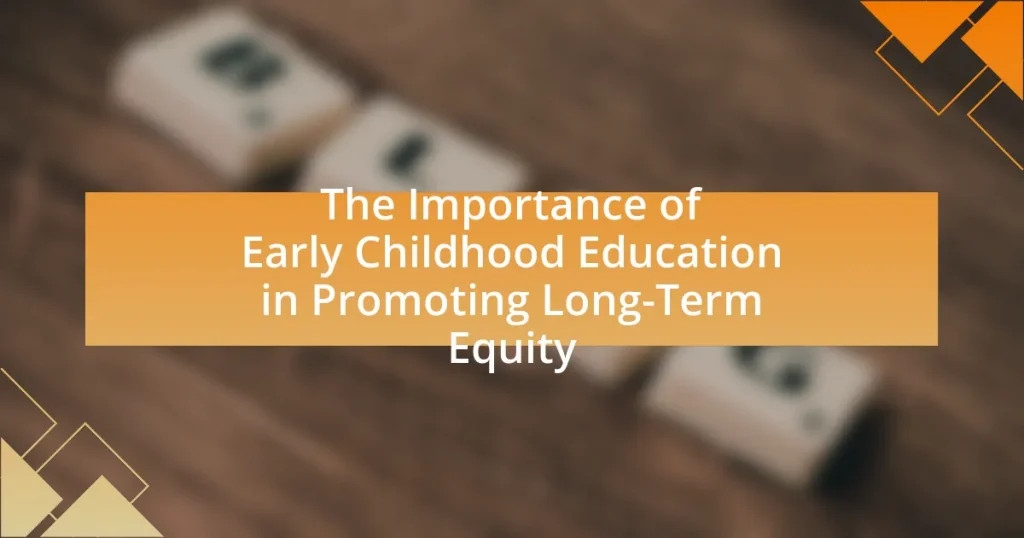Early childhood education is a critical factor in promoting long-term equity by providing foundational skills and knowledge that help bridge gaps for children from diverse socioeconomic backgrounds. Research shows that access to quality early education enhances cognitive and social-emotional development, leading to improved academic outcomes and reduced disparities in educational attainment. Key principles supporting equity in early childhood education include inclusivity, culturally responsive teaching, and access to resources, which collectively contribute to narrowing achievement gaps. Furthermore, the involvement of families and communities plays a vital role in enhancing the effectiveness of early education, while addressing barriers such as financial constraints and limited availability is essential for ensuring equitable access. Overall, evidence indicates that investing in early childhood education yields significant long-term benefits, both socially and economically, thereby fostering equity for future generations.

What is the Importance of Early Childhood Education in Promoting Long-Term Equity?
Early childhood education is crucial for promoting long-term equity as it provides foundational skills and knowledge that help level the playing field for children from diverse backgrounds. Research indicates that access to quality early education significantly improves cognitive and social-emotional development, which are essential for academic success and lifelong learning. For instance, a study by the National Institute for Early Education Research found that children who attend high-quality preschool programs are more likely to graduate from high school and pursue higher education, thereby reducing disparities in educational attainment. Furthermore, early childhood education can mitigate the effects of socioeconomic disadvantages, as it equips children with critical thinking and problem-solving skills that are vital in today’s economy.
Why is early childhood education considered a foundational element for equity?
Early childhood education is considered a foundational element for equity because it provides all children, regardless of their socio-economic background, with essential skills and knowledge that promote lifelong learning and development. Research indicates that access to quality early education significantly narrows achievement gaps, as children from disadvantaged backgrounds who participate in early education programs demonstrate improved cognitive and social-emotional outcomes compared to their peers who do not. For instance, a study by the National Institute for Early Education Research found that children who attended high-quality preschool programs were more likely to succeed in school and less likely to require special education services, thereby contributing to greater equity in educational attainment and future opportunities.
What are the key principles of early childhood education that support equity?
The key principles of early childhood education that support equity include inclusivity, culturally responsive teaching, and access to resources. Inclusivity ensures that all children, regardless of their background, have equal opportunities to participate and thrive in educational settings. Culturally responsive teaching acknowledges and incorporates the diverse cultural backgrounds of children, fostering a sense of belonging and respect. Access to resources, such as quality materials and trained educators, is essential for providing equitable learning experiences. Research indicates that equitable early childhood education can significantly reduce achievement gaps, as highlighted in the National Institute for Early Education Research’s findings, which show that children from disadvantaged backgrounds benefit greatly from high-quality early education programs.
How does early childhood education impact social and economic disparities?
Early childhood education significantly reduces social and economic disparities by providing foundational skills and resources that enhance children’s cognitive and social development. Research indicates that children who participate in high-quality early childhood education programs are more likely to succeed academically, leading to higher graduation rates and better job opportunities. For instance, a study by the National Institute for Early Education Research found that children from low-income families who attended preschool were 40% more likely to graduate from high school compared to their peers who did not. This educational advantage translates into increased earning potential, thereby narrowing the income gap between different socioeconomic groups. Additionally, early childhood education fosters social skills, which are crucial for building networks and accessing opportunities, further contributing to long-term equity.
How does early childhood education influence individual development?
Early childhood education significantly influences individual development by fostering cognitive, social, and emotional growth during critical formative years. Research indicates that children who participate in high-quality early education programs demonstrate improved academic performance, better social skills, and enhanced emotional regulation compared to those who do not. For instance, a study by the National Institute for Early Education Research found that children enrolled in preschool programs are 30% more likely to achieve higher test scores in later grades. Additionally, early childhood education helps close achievement gaps, particularly for disadvantaged children, promoting long-term equity in educational outcomes.
What cognitive benefits are associated with early childhood education?
Early childhood education significantly enhances cognitive development in children. Research indicates that children who participate in early education programs exhibit improved language skills, better problem-solving abilities, and enhanced critical thinking. For instance, a study by the National Institute for Early Education Research found that children enrolled in high-quality preschool programs scored higher on standardized tests in reading and math compared to their peers who did not attend such programs. Additionally, early education fosters social-emotional skills, which are crucial for cognitive growth, as children learn to interact and collaborate with others. These cognitive benefits contribute to long-term academic success and can help bridge achievement gaps, promoting equity in education.
How does early childhood education affect emotional and social skills?
Early childhood education significantly enhances emotional and social skills by providing structured environments where children learn to interact with peers and develop self-regulation. Research indicates that children who participate in high-quality early childhood education programs exhibit improved emotional intelligence, better conflict resolution skills, and stronger relationships with peers. For instance, a study published in the journal “Child Development” by the authors Campbell and Ramey found that children enrolled in early education programs demonstrated higher levels of social competence and lower levels of behavioral problems compared to those who did not attend such programs. This evidence underscores the critical role early childhood education plays in fostering essential emotional and social skills that contribute to long-term equity in development.
What role do families and communities play in early childhood education?
Families and communities play a crucial role in early childhood education by providing support, resources, and a nurturing environment that fosters children’s development. Research indicates that parental involvement significantly enhances children’s learning outcomes, as families who engage in educational activities at home contribute to higher academic achievement and social skills. Additionally, communities offer essential services such as early childhood programs, health care, and social support networks, which are vital for holistic child development. For instance, a study by the National Institute for Early Education Research found that children from supportive family and community backgrounds are more likely to succeed in school and later in life, demonstrating the interconnectedness of these factors in promoting long-term equity.
How can family engagement enhance the effectiveness of early childhood education?
Family engagement enhances the effectiveness of early childhood education by fostering a collaborative environment that supports children’s learning and development. When families actively participate in educational activities, children demonstrate improved academic performance, better social skills, and increased motivation to learn. Research from the Harvard Family Research Project indicates that children whose families are engaged in their education are more likely to succeed in school and beyond, highlighting the critical role of family involvement in promoting positive educational outcomes.
What community resources are essential for supporting early childhood education?
Community resources essential for supporting early childhood education include access to quality childcare facilities, trained educators, and family support services. Quality childcare facilities provide safe environments where children can learn and develop essential skills. Trained educators are crucial as they implement developmentally appropriate practices that foster cognitive and social-emotional growth. Family support services, such as parenting classes and health resources, enhance the home environment, ensuring that children receive consistent support both at school and at home. Research indicates that communities with robust early childhood education resources see improved educational outcomes and long-term equity for children, as highlighted in the report by the National Institute for Early Education Research, which emphasizes the correlation between community investment in early education and positive developmental trajectories.
How can early childhood education systems be improved to promote equity?
Early childhood education systems can be improved to promote equity by implementing universal access to quality programs, ensuring that all children, regardless of socioeconomic status, have the opportunity to participate. Research indicates that children from low-income families benefit significantly from early education, as it helps close achievement gaps; for instance, a study by the National Institute for Early Education Research found that children who attend high-quality preschool programs are more likely to succeed academically and socially. Additionally, training educators in culturally responsive teaching practices can enhance inclusivity and address diverse learning needs, further promoting equity in early childhood education.
What are the barriers to accessing quality early childhood education?
Barriers to accessing quality early childhood education include financial constraints, lack of availability, and insufficient awareness of the benefits. Financial constraints often arise from high tuition costs, which can deter low-income families from enrolling their children in quality programs. According to the National Institute for Early Education Research, families earning below the poverty line spend approximately 30% of their income on childcare, making it unaffordable for many. Additionally, a lack of availability in certain regions, particularly rural or underserved urban areas, limits access to quality programs. The U.S. Department of Education reports that many communities lack sufficient early childhood education facilities, exacerbating inequities. Lastly, insufficient awareness about the importance of early childhood education can prevent families from seeking out available resources, as many may not understand how early education impacts long-term academic and social outcomes.
How do socioeconomic factors influence access to early childhood education?
Socioeconomic factors significantly influence access to early childhood education by creating disparities in availability and affordability. Families with higher income levels are more likely to afford quality early childhood programs, while low-income families often face barriers such as high tuition costs and limited program availability. For instance, a report from the National Institute for Early Education Research indicates that children from low-income households are less likely to enroll in preschool programs, with only 50% participating compared to 75% of children from higher-income families. This inequity in access can lead to long-term educational and developmental gaps, perpetuating cycles of poverty and limiting opportunities for children from disadvantaged backgrounds.
What policies can be implemented to reduce these barriers?
To reduce barriers in early childhood education, policies such as increased funding for universal pre-K programs, enhanced teacher training, and improved access to resources for low-income families can be implemented. Increased funding for universal pre-K programs ensures that all children, regardless of socioeconomic status, have access to quality early education, which has been shown to improve long-term educational outcomes. Enhanced teacher training focuses on equipping educators with the skills necessary to address diverse learning needs, thereby fostering an inclusive environment. Additionally, improving access to resources for low-income families, such as transportation and childcare subsidies, directly addresses logistical barriers that prevent participation in early education programs. These policies collectively contribute to promoting equity in educational opportunities from a young age.
What evidence supports the long-term benefits of early childhood education for equity?
Early childhood education significantly contributes to long-term equity by improving academic outcomes and reducing achievement gaps among disadvantaged populations. Research from the National Institute for Early Education Research indicates that children who participate in high-quality early childhood programs are more likely to graduate from high school and pursue higher education, with studies showing a 20% increase in graduation rates for participants compared to non-participants. Additionally, the Perry Preschool Project demonstrated that individuals who received early education had higher earnings and lower rates of incarceration, highlighting the economic and social benefits that promote equity. These findings underscore the critical role of early childhood education in leveling the playing field for children from diverse backgrounds.
How do longitudinal studies demonstrate the impact of early childhood education on equity?
Longitudinal studies demonstrate the impact of early childhood education on equity by tracking the long-term outcomes of children who participated in early education programs compared to those who did not. These studies, such as the High/Scope Perry Preschool Study, show that children who received quality early childhood education exhibit higher academic achievement, better social skills, and improved economic outcomes later in life. For instance, the Perry Preschool Study found that participants were more likely to graduate from high school and less likely to be involved in criminal activities, leading to a significant reduction in socioeconomic disparities. This evidence highlights how early childhood education can level the playing field, particularly for children from disadvantaged backgrounds, thereby promoting equity.
What are the economic returns on investment in early childhood education?
Investing in early childhood education yields significant economic returns, estimated at $4 to $9 for every dollar spent. These returns arise from improved educational outcomes, increased earning potential, and reduced social costs. Research by the National Institute for Early Education Research indicates that children who participate in high-quality early education programs are more likely to graduate from high school and earn higher wages, contributing positively to the economy. Additionally, a study by the Heckman Equation highlights that early investments lead to lower rates of crime and reduced need for social services, further enhancing economic benefits.
What best practices can be adopted to enhance early childhood education for equity?
To enhance early childhood education for equity, implementing culturally responsive teaching practices is essential. Culturally responsive teaching acknowledges and incorporates students’ cultural backgrounds into the curriculum, which has been shown to improve engagement and learning outcomes. Research indicates that when educators reflect the diversity of their students in teaching materials and methods, it fosters a more inclusive environment, leading to better academic performance and social-emotional development. Additionally, providing access to high-quality early childhood programs for all children, regardless of socioeconomic status, is crucial; studies reveal that children from low-income families who attend quality early education programs demonstrate significant gains in cognitive and social skills compared to their peers.



